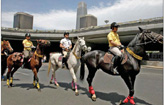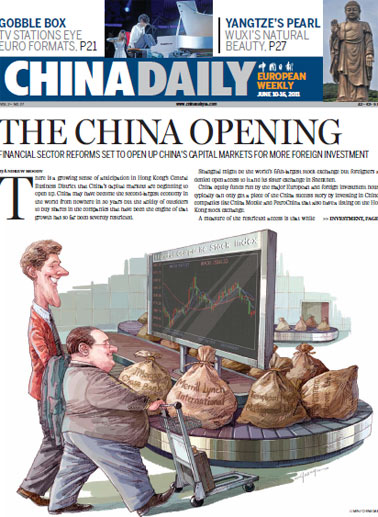Society
Political debates take center stage at the dinner table
Updated: 2011-06-14 08:05
By Kelly Chung Dawson (China Daily)
Recently in New York City, three staged readings offered a barebones glimpse into a translated play from the National Center for the Performing Arts in China that tackles both social issues and what producers call an "ultimately universal" family dynamic.
Commissioned by China's Ministry of Culture for the 60th anniversary of the founding of the People's Republic of China and written by Chinese playwright Meng Bing, The Final Struggle opened in the fall of 2008 and has since been performed in China 87 times, according to producers.
Set in modern China, the play focuses on three generations of one family, on the eve of the Chinese New Year. The patriarch, an aging Communist veteran, struggles with his sons and their wholehearted embrace of a new China, one defined by money. When a long-lost sister and her son return to join the family during the holiday, a corrupt and dishonest family member is outed.
American producer Don Frantz first saw the piece in China two years ago. He is now working to bring a translated version of the full play to Western audiences and hopes to open it at the regional level next year, he says.
"I saw it and the audience was both laughing and crying, and my translator was, too," he says.
"The writer, Meng Bing, set out to write a play about 'the good old days' ...You found a great country, but then what happens? You reach the point where the question is whether a person's loyalty is with their country or their family, and we see that here in America, too. The ideals of the people who started the country fade away as people grab for what they can."
In several scenes, members of the family heatedly discuss corruption in the government, debating the merits of both the old and new ways of Chinese life.
"Villagers have tried to sue (local government officials) but the judges and police are incapable of doing anything," one character says of rural government corruption.
"Most of (the officials) are bad. Where we're from, only some government officials are good."
It was this open discussion that convinced Frantz and his associate producer, Laurie Brown, to pursue the production, Brown says.
"Whenever I speak to Westerners about China and Chinese people, I feel that Americans really underestimate their cultural advancement," she says.
"Our hope is that, in watching this, Americans might realize that Chinese society is farther ahead than we've given them credit for."
Frantz echoes Brown's sentiments.
"I don't think that Americans understand that these debates do actually even happen," he says.
"Our press talks about China as a closed, strict society. But when you get down to the dinner table and friends, there's as heated debate about the direction of the country as there is in America and at American dinner tables."
Glenn Kubota, the actor who portrays the patriarch in the play, says that there is often more freedom to express a message in art.
"The impression here in the United States is that individualism is suppressed in China, but it's interesting that art transcends that tension," he says.
"Art is more nuanced, and people can interpret the message as they like."
In one scene, the patriarch yells at his son: "I don't prohibit you from speaking ill of the Communist Party, but what I want to hear are suggestions! You can't speak ill of the Party if you're not going to offer solutions. We cannot rule the country, but we can rule our own family."
Director Wu Xiaojiang says: "People are more able to express their own opinions these days as Chinese society becomes more and more open, although, generally, it still remains mostly in private."
American audiences seem to appreciate both the openness of the play as well as the universal nature of the family's story.
"I think the play was attempting to establish the importance of family and respect for elders, while portraying the differences among generations," audience member Audrey Rohan says.
"I thought it was very interesting, and it gave a real window to American audiences on the government's importance in family life and in a lot of personal decisions that are made."
Wai-Ching Ho, who portrays the family's matriarch, says she believes the play was an attempt to understand how progress affects the generations.
"Society changes, and that's inevitable," she says.
"The play reflects on the way idealism can disintegrate over time. That's what's happening in China and in the world. But I don't think the playwright has made a specific judgment or is condemning anyone for subscribing to these changes."
China Daily
E-paper

Pearl on the Yangtze
Wuxi is considered a town of natural beauty and its motto is "city of water and warmth".
Prose and consternation
Riding on a mystery train
Way of a warrior
Specials

Wealth of difference
Rich coastal areas offer contrasting ways of dealing with country's development

Seal of approval
The dying tradition of seal engraving has now become a UNIVERSITY major

Making perfect horse sense
Riding horses to work may be the clean, green answer to frustrated car owners in traffic-trapped cities
